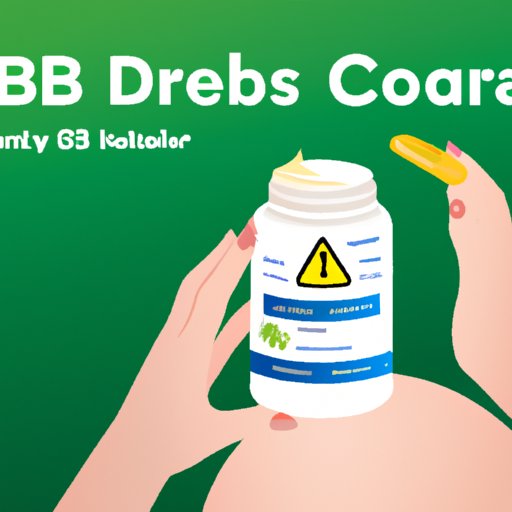Can You Use Topical CBD Cream While Pregnant?
Pregnancy is a special time in a woman’s life, and expecting mothers may experience a variety of aches and pains. Many women have turned to CBD products, including topical creams, to help alleviate symptoms. However, when it comes to using CBD during pregnancy, there are some important considerations to keep in mind.
In this article, we will explore the safety, benefits, and risks of using topical CBD cream during pregnancy. We will also provide expert opinions and scientific evidence to help expecting mothers make an informed decision.

Safety Precautions When Using Topical CBD Cream While Pregnant
Before using any CBD product during pregnancy, it is important to discuss it with your healthcare provider. While there is limited research on the effects of CBD during pregnancy, there are some potential risks that should be considered.
Firstly, CBD products, including topical creams, may contain trace amounts of THC, the psychoactive compound found in marijuana. Although the amount is typically below the legal limit of 0.3%, it is still possible for THC to cross the placental barrier and affect the developing fetus.
Secondly, there is some evidence to suggest that CBD may affect hormone levels and disrupt the endocannabinoid system, which could have an impact on fetal development. However, more research is needed to fully understand these potential risks.
That being said, if your healthcare provider approves the use of topical CBD cream, there are some safety precautions you can take to minimize potential risks. Firstly, look for reputable brands that provide third-party lab testing to ensure that the products contain no contaminants and accurately reflect the ingredients on the label. Secondly, start with a low dosage and gradually increase as needed, monitoring any changes in symptoms or side effects. Finally, avoid using CBD products during the first trimester of pregnancy, as this is a crucial time for fetal development.
Benefits and Risks of Using Topical CBD During Pregnancy
There are potential benefits to using topical CBD creams during pregnancy, including pain relief, reduced inflammation, and relaxation. Many expecting mothers turn to CBD products as an alternative to traditional pain medications or anti-inflammatory drugs, which may also carry their own risks during pregnancy. Additionally, some women report using CBD products to combat anxiety or depression associated with pregnancy.
However, it is important to note that there are also potential risks associated with using topical CBD creams during pregnancy. As previously mentioned, CBD products may contain trace amounts of THC, which could potentially have an impact on fetal development. Additionally, there is limited research on the effects of CBD during pregnancy, so the long-term effects are not fully understood. Finally, some women may experience allergic reactions or skin irritation from using CBD products, so it is important to monitor any changes in symptoms or side effects.

To Use or Not to Use: Understanding the Potential Effects of Topical CBD During Pregnancy
Ultimately, the decision to use topical CBD cream during pregnancy is a personal one and should be made in consultation with a healthcare provider. There are pros and cons to consider, and the decision should be based on individual needs and risk factors.
Some factors to consider when deciding whether or not to use topical CBD cream during pregnancy include the severity of symptoms, the stage of pregnancy, and any underlying health conditions. If symptoms are severe and traditional medications are not an option, CBD may be a viable alternative. However, if the risks outweigh the potential benefits, it may be best to avoid CBD products altogether.

Separating Fact from Fiction: The Science Behind Topical CBD During Pregnancy
There is limited research on the effects of CBD during pregnancy, and much of the available evidence is based on animal studies or anecdotal reports. However, some scientific studies have shown that CBD may have anti-inflammatory properties and could potentially help reduce pain and anxiety. Additionally, some experts suggest that CBD may be safer than traditional pain medications or anti-inflammatory drugs, which may carry a higher risk of adverse effects during pregnancy.
It is important to note, however, that more research is needed to fully understand the effects of CBD during pregnancy, and expecting mothers should proceed with caution and consult with a healthcare provider before using any CBD products.
Investigating the Evidence and Expert Opinions Regarding Topical CBD Cream for Expecting Mothers
Expert opinions on the use of topical CBD cream during pregnancy vary. Some healthcare providers may recommend the use of CBD as a safe and effective alternative to traditional pain medications or anti-inflammatory drugs, while others may advise against it due to potential risks. Additionally, there is limited research on the topic, so it is important to approach the use of CBD products during pregnancy with caution and careful consideration.
At the end of the day, the decision to use topical CBD cream during pregnancy is a personal one that should be made in consultation with a healthcare provider. It is important to weigh the potential benefits and risks before making a decision, and to monitor any changes in symptoms or side effects.
Conclusion
Using topical CBD cream during pregnancy is a complex issue that requires careful consideration and consultation with a healthcare provider. While there are potential benefits to using CBD products, such as pain relief and relaxation, there are also potential risks that should be considered, such as the potential impact on fetal development. Additionally, there is limited research on the effects of CBD during pregnancy, so it is important to approach the use of CBD products with caution and careful consideration.
If you are considering using topical CBD cream during pregnancy, it is important to discuss it with your healthcare provider and take appropriate safety precautions. Look for reputable brands, start with a low dosage, and monitor any changes in symptoms or side effects. By being informed and proactive, you can make the best decision for yourself and your baby.
